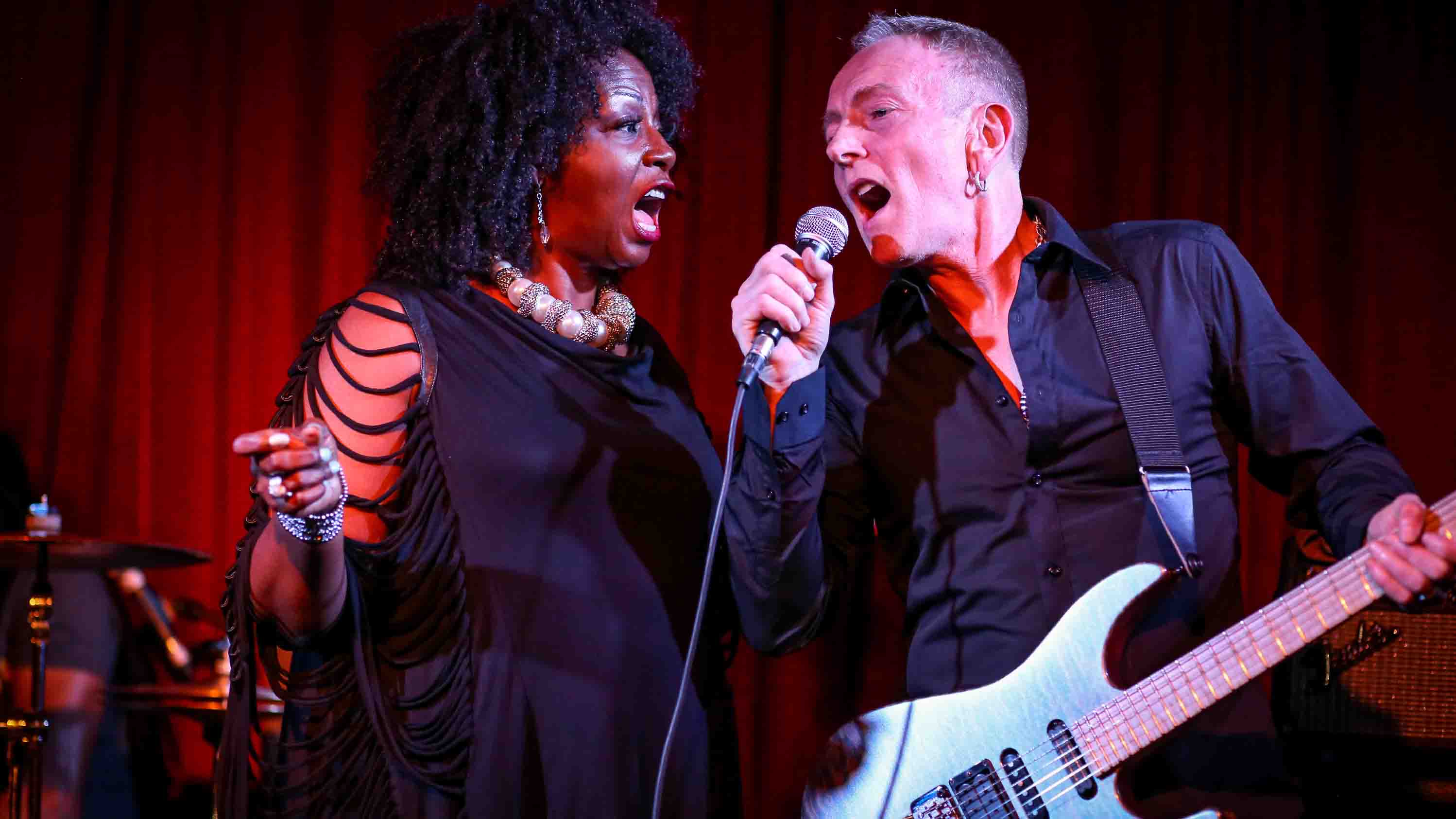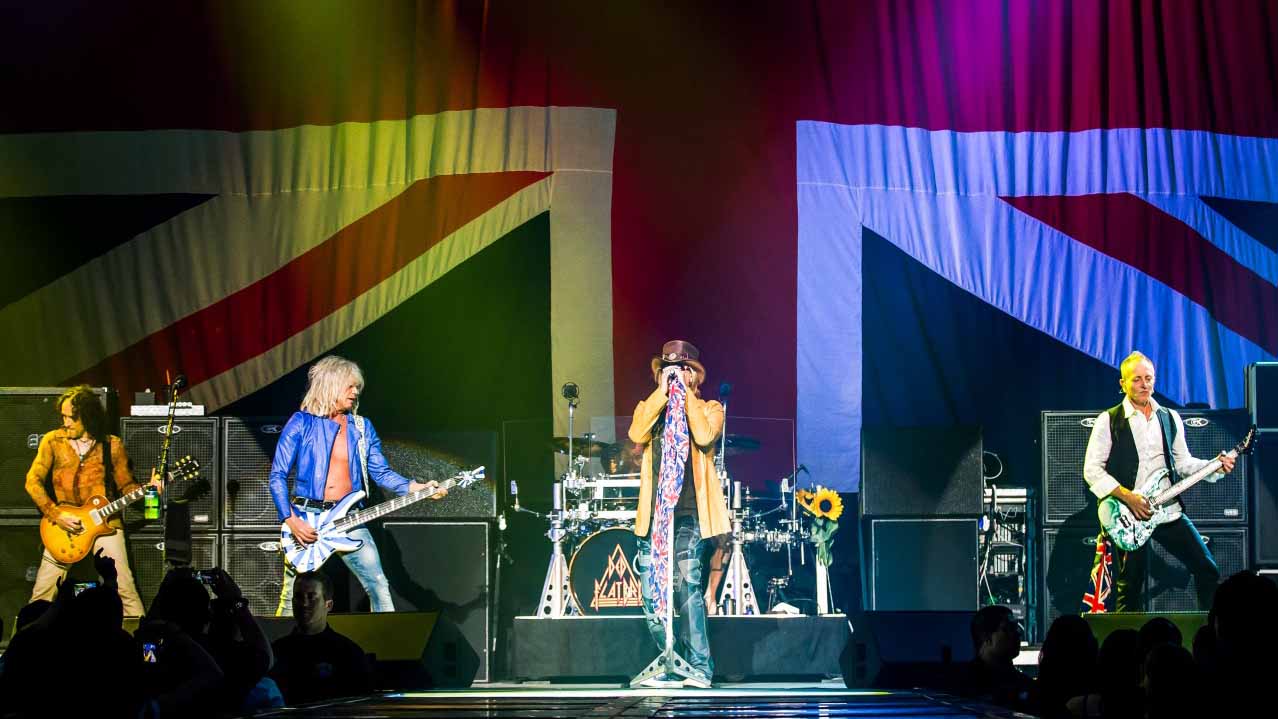
Introduction
For over 30 years, guitarist Phil Collen has packed Def Leppard’s albums with widescreen riffs and searing solos. So it’s a little surprising to hear him describe the upcoming, eponymous debut album by his sideband Delta Deep as his “first guitar record.”
“There is a lot of guitar on Def Leppard records,” Collen says, “but the focus is on production, arrangements and vocals - as it should be. With Delta Deep, it’s a more direct kind of expression for me. I call it ‘extreme blues’ - very upfront and aggressive. I’m having a good time with it.”
Joining Collen in Delta Deep are Stone Temple Pilots bassist Robert DeLeo and session/touring drumming ace Forrest Robinson. Fronting the outfit is Debbi Blackwell-Cook, who just so happens to be the godmother of Collen’s wife, Helen. According to the guitarist, he knew that he wanted to work with Blackwell-Cook on his wedding day.
“Debbi sang an Ella Fitzgerald song at our wedding and just knocked me out,” Collen marvels. “She’s got one of those great soul voices - she’s like Aretha or Chaka Kahn - but she can rock her ass off, as well. We started goofing around the house playing Motown songs, and then we took it from there.”
Once DeLeo and Robinson got involved, Collen says that the sound of the band changed radically, going from a more traditional blues and soul approach to “something like Rage Against The Machine meets Muddy Waters”.
“Forrest is from Memphis, and he grew up in the church playing gospel and spirituals,” Collen explains. “He gets to reconnect with all of that here. And Robert and I come from the big rock band thing, so we bring that kind of vibe to what Forrest does and it sort of explodes.
“I love it when bands have a core foundation but they take a really surprising left turn,” Collen continues. “Think about Led Zeppelin and The Stones: they were blues purists at heart, but they knew they had to expand the music. We look at Delta Deep the same way. There’s the blues base, but we’re not confined by limitations. I know I got goosebumps when I play with these guys, and doing this for so long, that’s pretty cool.”
Delta Deep’s self-titled debut album is out now, and you can buy it at iTunes. On the following pages, Collen runs down his top five tips for guitarists.

1. Try to sing
“A lot of guitar players are intimidated about singing. They’re very confident of their guitar skills and their ability to shred like crazy, but put a microphone in front of them and they freeze up. That’s crazy. Everybody can sing, and I think everybody should sing.
“Okay, so you might not be lead singer material - very few guys are - but that doesn’t mean you can’t sing something. If you can figure out your range and work with whatever abilities you do have, you can sing harmonies. Right away, your stature in your band will go right up. ‘We’ve got another singer!’ The rest of the band will be asking you to add parts. You’ll increase your value to your band tenfold when you start singing.
“Also, being able to vocalise will help your guitar playing and your writing. If you sing vocal lines as you play, you might work out new and different solos than you normally would. That song you were trying to write but you just couldn’t finish? If you belt it out to yourself, you just might figure it out.
“So singing opens you up to new musical possibilities, even if you just sit there and scat-sing while you play. Don’t be afraid to open up that throat - you might be pleasantly surprised by what comes out.”

2. Listen to what inspires you
“Everybody always says, ‘Listen to all sorts of music.’ I’m going to go somewhere else with that. I think you should listen to what you like. Listen to what inspires you. You can try to check out other genres and styles, but if you don’t get anything from them, don’t beat yourself up about it. Stay with what moves you.
“I never learned fingerstyle because I never really liked it. I wanted to make a guitar scream and cry, so that’s the kind of guitar music that I listened to - guys who really wailed. That’s the music that inspired me, and I knew that’s where my talents really lie. I didn’t have the time to sit around and try to be an amazing fingerstyle player; I was developing the skills that I knew would ultimately serve me best.
“A lot of other guitar players will guilt you - ‘You shouldn’t have blinders’ on and all that rubbish. I want to take that guilt away. Don’t feel bad about knowing what you know, liking what you like and sticking with it. If blues inspires you, listen to blues. If metal gets you off, listen to metal. And on and on it goes. Why stay away from something you love? That’s crazy.”

3. Choose a guitar that you're going to play
“I love playing acoustic guitar now, but when I started, I didn’t want to play acoustic at all. I thought it was kind of boring. I wanted to play electric and be like Ritchie Blackmore. He was smashing it up, playing loud and wild - it gave me goosebumps. So electric guitar was it for me; that’s what I chased.
“Using the acoustic as a writing tool and jamming away on it - that’s all great. I even like the limitations on it; it kind of forces you to play in other ways because it doesn’t give you tons of options. You’ve got to work at it and make it do something. But I’ve come to the acoustic after becoming an electric player, and for me, that was the way to go. If I was forced to play acoustic, I might have lost interest.
“Choose the guitar that you’re going to really dig and stick with that. It’s okay to want to be an acoustic player, just like it’s okay to want to be an electric player. You don’t have to be both if you don’t want to. My transition to the acoustic was natural and unforced. I came to it because I wanted to, not because I had to.”

4. Keep a guitar in the bathroom
“I know this might sound weird, but I play the guitar a lot when I’m on the toilet. I’ve practised and have written many a song while sitting on the shitter. It’s probably not healthy - doctors will say, 'You’ll get hemorrhoids if you spend too much time on the toilet' - but I think it’s very therapeutic.
“The bathroom is such a private place. It’s one of the few rooms where you can really be alone for a while. Nobody is going to bother you in the bathroom - most of the time. I think I started playing the guitar on the toilet because I might have been a little insecure; I figured, ‘Nobody’s watching me, so I can do whatever I want.’
“I would rather play the guitar than read when I’m in the bathroom. It’s a go-to thing for me. I have a guitar in every room, so why not keep one in the bathroom? Think about it: how many times are you on the toilet and a great idea comes to you? Plenty of times - hundreds of times. So when an idea strikes, be ready.”

5. Be aware that you're part of a team
“It’s easy to get bogged down with tiny little details. I know some guys who fuss over their rigs, their pedalboards, this and that on their guitars. One little thing gets changed about their gear and they go crazy. What I’ve found is, there’s no reason, because most people in the audience really can’t hear you.
“As a guitarist, you’re a star in your own mind. You’re playing attention to everything you do, and you’re hyper-focused on all of this minutia. The reality is, the audience has no idea. They’re listening to the singer and the overall sound of the whole band - this big wall of music coming at them.”
“Sure, your solos will get boosted, and various bits here and there will be heard more than others. Other than that, you’re part of the package. The audience isn’t picking apart each little subtlety - ‘Oh, the drummer’s kick drum sounds like this. The guitarist’s pitch sounds too whatever.’ In a monitor mix, it all gets kind of mashed together.
“I’m not saying you’re not an integral part of the band; of course you are. But that’s just it – you’re part of a band. It’s the whole band together, a team process. So don’t get too wound up about stuff that nobody can hear. Play your best and have a good time.”
Joe is a freelance journalist who has, over the past few decades, interviewed hundreds of guitarists for Guitar World, Guitar Player, MusicRadar and Classic Rock. He is also a former editor of Guitar World, contributing writer for Guitar Aficionado and VP of A&R for Island Records. He’s an enthusiastic guitarist, but he’s nowhere near the likes of the people he interviews. Surprisingly, his skills are more suited to the drums. If you need a drummer for your Beatles tribute band, look him up.
